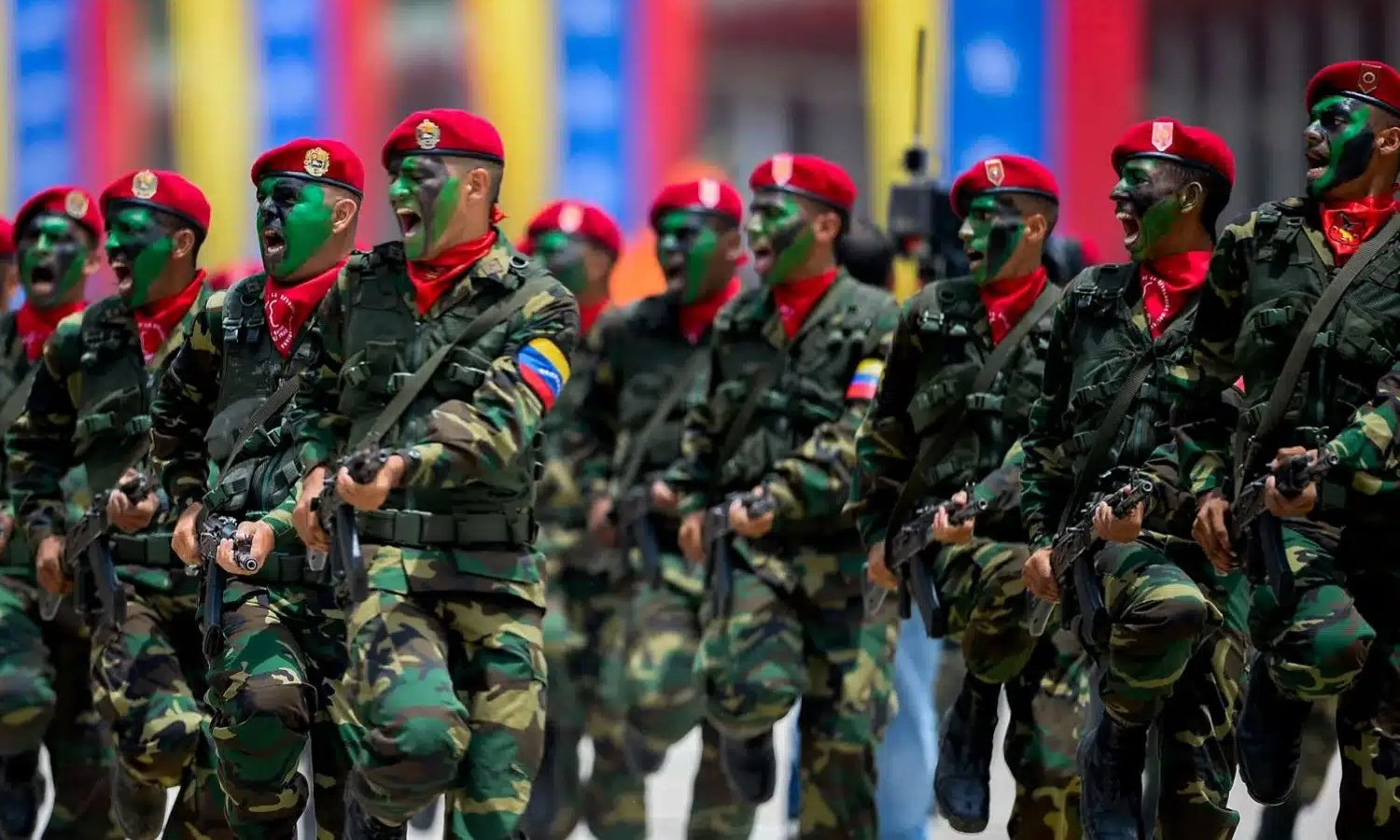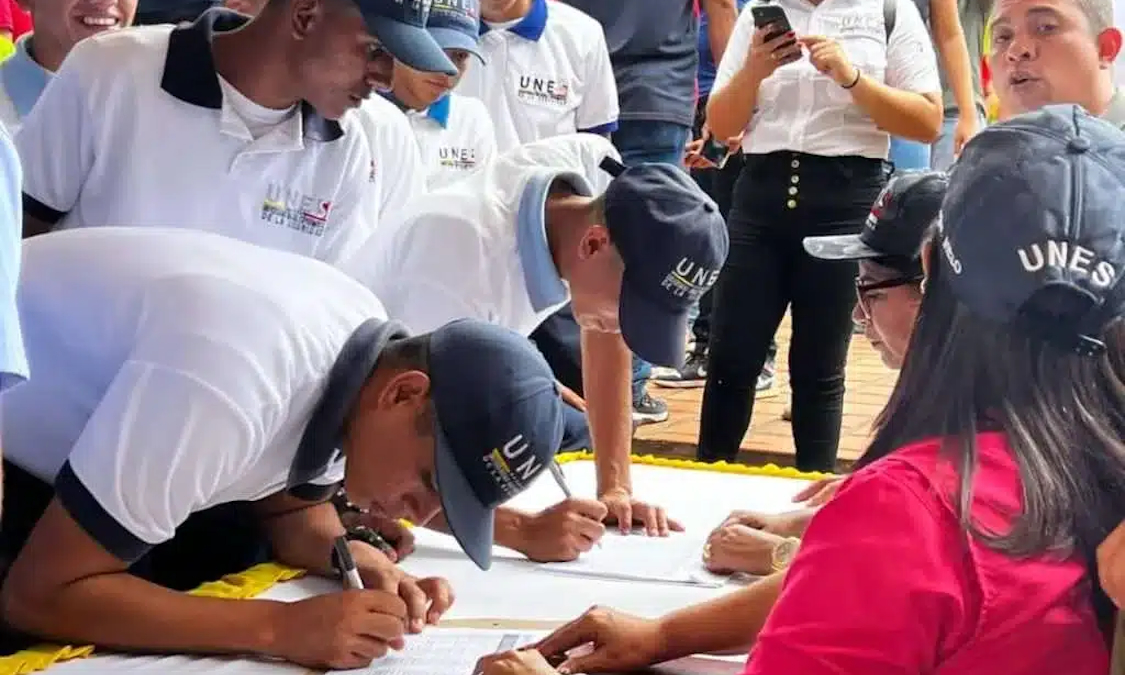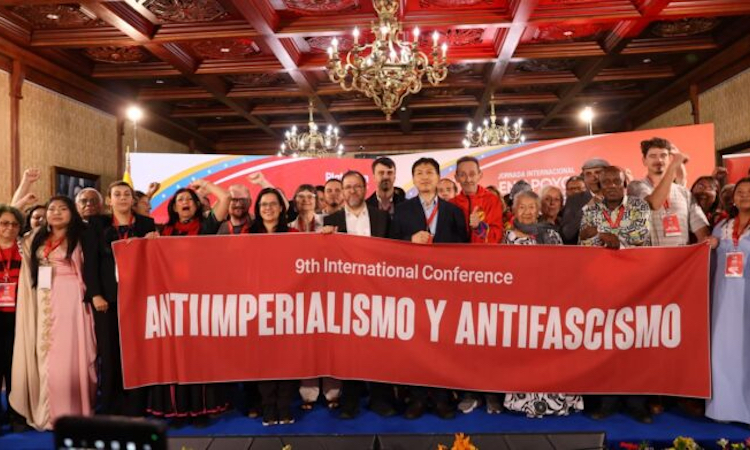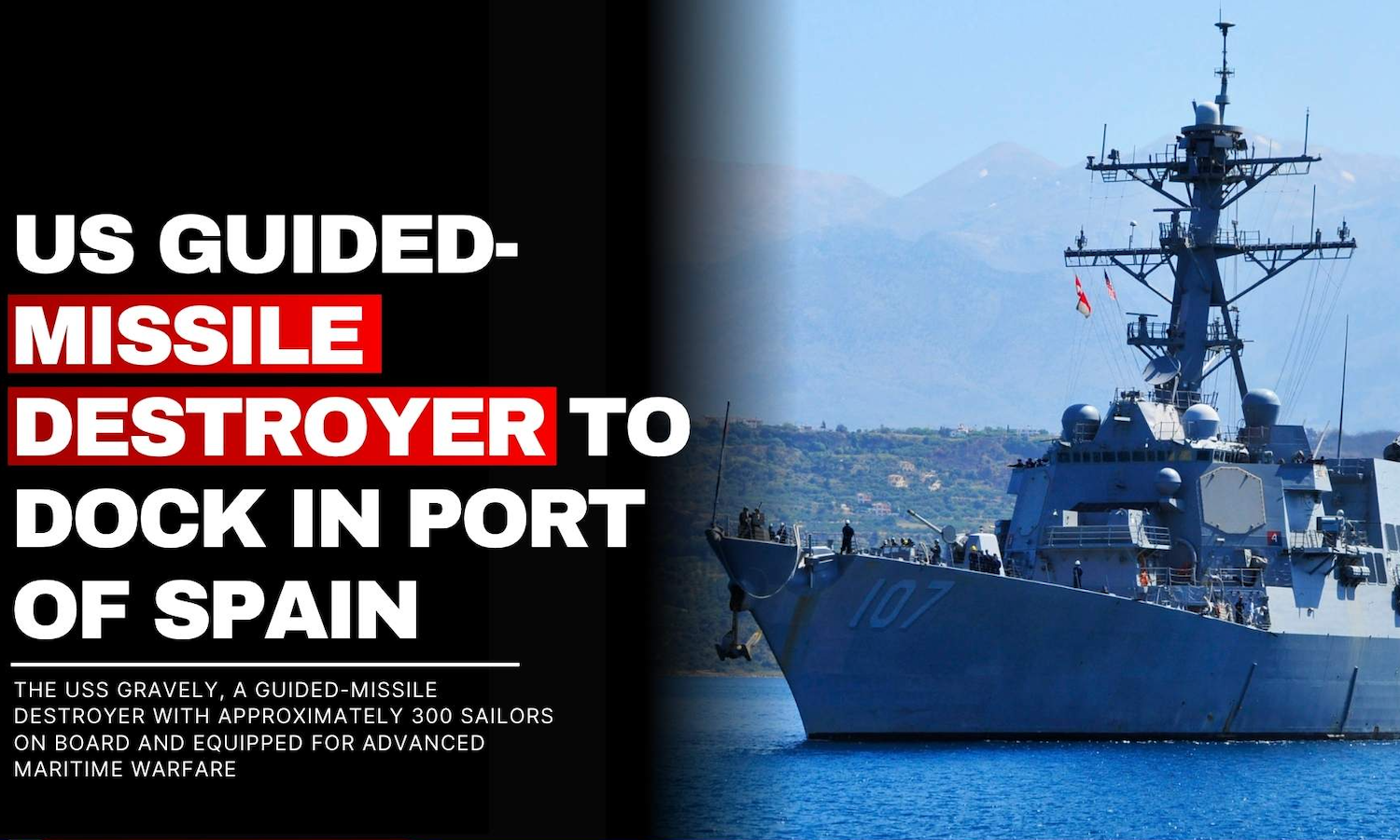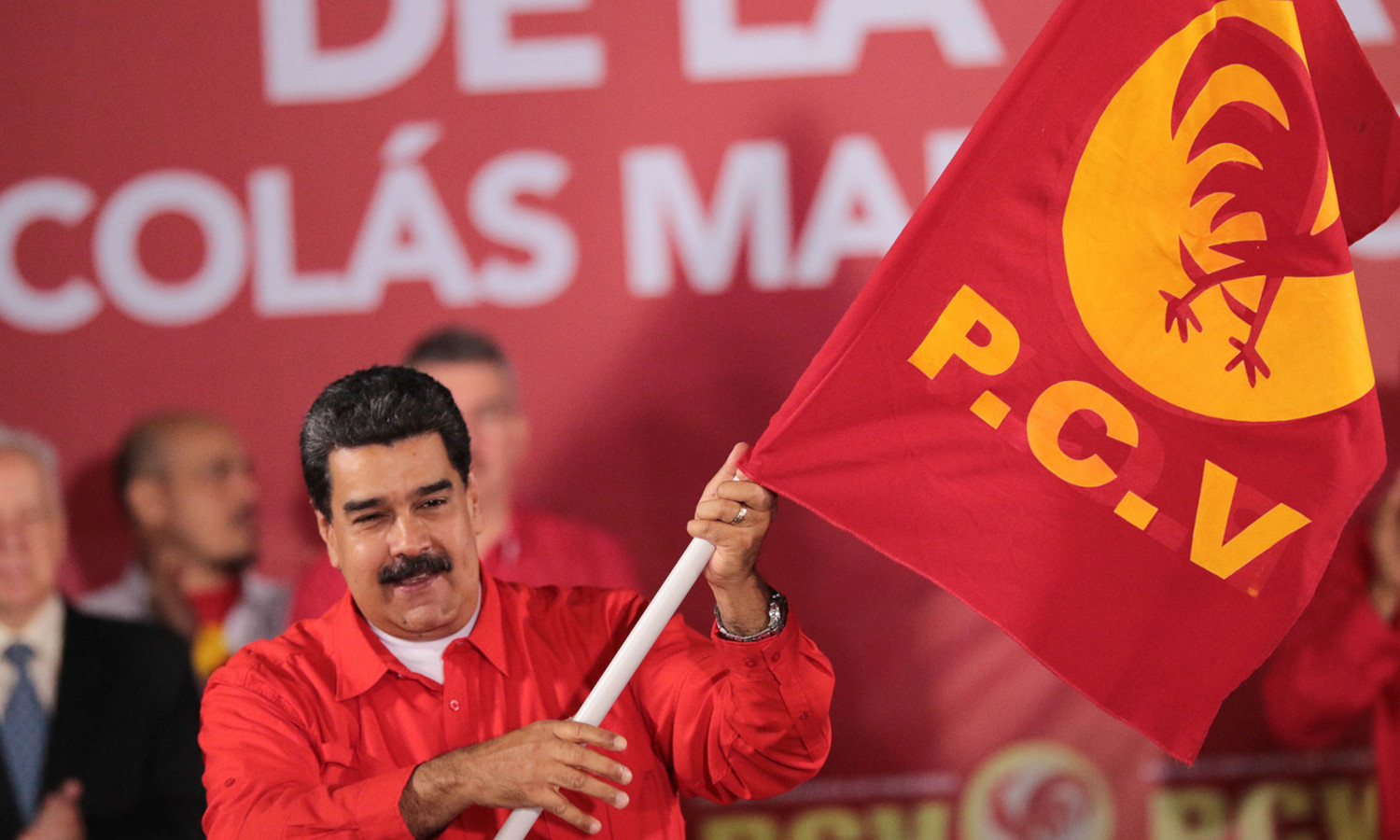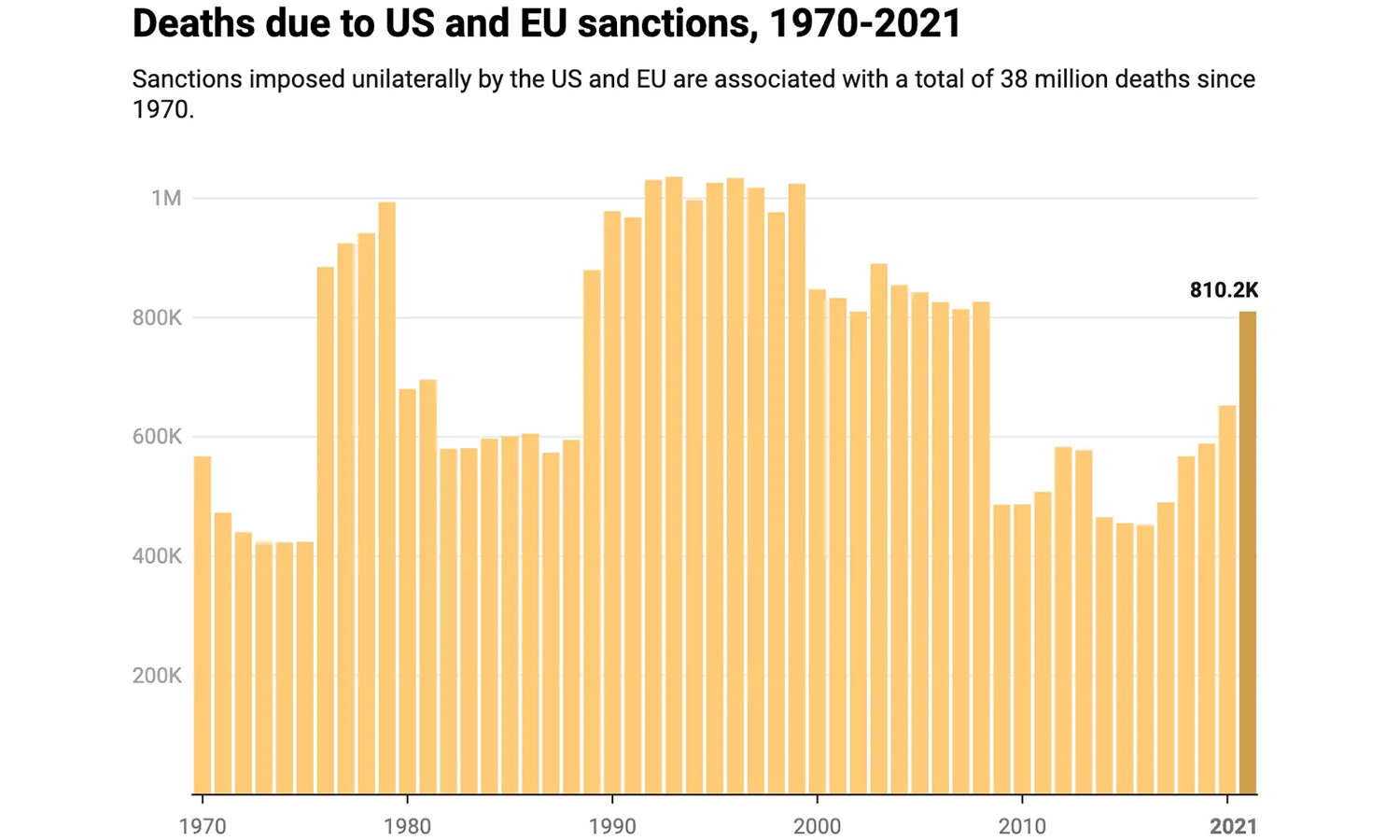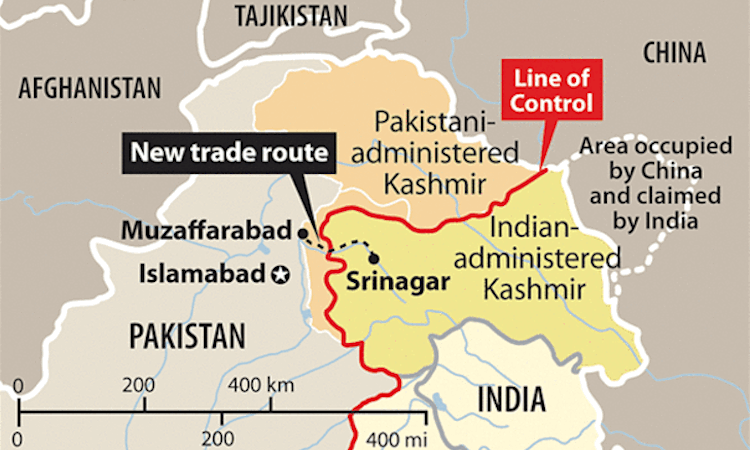Twenty-five years have passed since Hugo Chávez initiated Venezuela’s Bolivarian Revolution in February 1999. Twenty-five years of PSUV (United Socialist party) governments working to improve the economic, social and cultural conditions of the masses.
Twenty-five years of participatory democracy; of empowering people to transform society on the road to socialism. Twenty-five years during which the people of Venezuela have clearly expressed their support for the Bolivarian process at 28 out of a total of 30 electoral opportunities.
Twenty-five years of the revolutionary government defeating the efforts of US imperialism and its allies to destroy this process through sanctions, a failed coup d’etat, and even the creation of a fake ‘parallel’ government (complete with self-appointed alternative ‘president’ to act as its figurehead).
Twenty-five years of economic warfare, including genocidal blockades, forced isolation from the world market, and acts of assassination, invasion and terrorism. In short, 25 years of the Bolivarian Revolution staunchly defending itself against the open hostility and non-stop aggression of the imperialists and their compradors in the local oligarchy.
This July, it became clear that powerful forces continue trying to shatter a model of governance that aims to benefit the people of Venezuela and which has been chosen by them, seeking to replace it with one that will facilitate the looting of the country’s resources for the benefit of imperial corporations and their handful of super-rich local stooges.
During the presidential elections, the future of the Bolivarian Revolution was once again at stake. But the brave people of Venezuela have learned many lessons from the dark days of hyperinflation and ‘marimbas’ in the streets. They have learned that when the far-right opposition, headed by stooges such as Juan Guaidó and Maria Corina Machado, were travelling around the globe asking for ever more sanctions to be placed on their own people, President Nicolás Maduro and the PSUV leadership never stopped working to resolve the problems created by such economic aggression – with the people and for the people.
The latest attempts by US imperialism to bring about regime change have demonstrated once again the resilience of the Venezuelan people and their Bolivarian government. Their firm opposition to imperialist attempts to turn Venezuela back into a compliant colony are supported by several important pillars of the revolutionary process, which act together to enable the people to express their will.
The most important of these are: participatory democracy; the leading role of the PSUV; the union between the Venezuelan masses the armed and police forces; the role played by friendly countries; and the success of the ‘Plan de la Patria 2019-25’.
Participatory democracy
Before 1998, the main feature of political life in Venezuela was the ruling class’s role in perpetuating colonial subordination to US imperialism, which benefited US multinationals first and a tiny minority of local bourgeois second. Known as the Fourth Republic, this regime presented a façade of democracy based on the western liberal values for dependent countries, which kept the mass of the people underdeveloped, uneducated and outside of political life.
The election of Comandante Hugo Chávez as president effected a qualitative change in the life of the Venezuelan people, ushering in a socialist-leaning popular administration that aimed to found the republic on an entirely new basis. Dubbing this process the ‘Bolivarian Revolution’ (named after the 19th-century anti-colonial liberation leader Simón Bolívar), President Chávez announced his government’s intention of creating a genuinely participatory democracy and of building an independent, self-reliant, multiethnic and multicultural society.
The Bolivarian constitution guaranteed the rights of the people to be involved in decision-making by introducing new mechanisms of participation such as open assemblies, referendums, and the power to remove government officials.
The desire to build a genuinely popular power (poder popular) in the country has led to the creation of new decision-making processes far beyond the established practices of bourgeois parliamentary ‘representation’. New types of parliaments and elections have been supplemented by other forms of mass involvement in the running of society. Working people are organised in cooperatives, in socially-run production companies, in local communities and communal councils, and all have been given the power to take control over growing aspects of their lives and destinies.
Participatory democracy is stablished as a constitutional political right in article 62 of the Bolivarian constitution as follows: “The participation of the people in forming, carrying out and controlling the management of public affairs is the necessary way of achieving the involvement to ensure their complete development, both individual and collective. It is the obligation of the State and the duty of society to facilitate the generation of optimum conditions for putting this into practice.”
The building blocks of the participatory democracy include:
- Referenda, allowing the people to impose their will over existing laws and those who hold public office.
- Local and communal councils, which evaluate proposals for community projects and develop a municipal plan.
- Social audit controls, under which citizens have the right to request a financial and non-financial audit of any public office.
- Citizens’ assemblies, which are decision-making bodies whose decisions are binding.
- Civil society involvement in government.
- Cooperatives.
As an example, elections took place on 25 August to select priority projects for 4,505 communal circuits, which comprise 49,000 communal councils, with the participation of approximately 1.5 million communal spokespersons.
As President Chavez stressed in his speech ‘El golpe de Timon’, this model embodies the popular people’s power under the slogan ‘Comuna o Nada’ (Commune or Nothing), and it has generated the real social change that is at the heart of the Bolivarian process, making the country far stronger in the face of challenges from within and without.
The leading role of the PSUV
The guiding force behind all these developments has been the United Socialist Party of Venezuela (PSUV).
Launched by Hugo Chávez in 2006, the process of creating this mass popular party involved participation by nearly six million aspiring militants, convened in thousands of meetings nationwide. It included the organisation of ‘socialist battalions‘ to debate constitutional reform, and the election of 1,681 delegates to the party’s founding congress in March 2008.
At this congress, delegates representing 1.2 million active members adopted a platform defined as “democratic, anti-imperialist and anticapitalist”, electing Hugo Chávez as the party’s president.
After the congress, the real work began, as the party worked to raise the political consciousness and social participation of workers, peasants, students and professionals. With varied levels of political experience, and coming from a range of social and cultural backgrounds, party members were given a basic training in history, economics and politics, as well as in the key differences between capitalism and socialism.
The ideological foundations of the PSUV are described in the party’s founding document, the Red Book (El Libro Rojo), which says:
“The party will strive to train its militants in ‘El arbol de las Tres Raíces’ (The Tree of the Three Roots) – the thought and actions of Simón Bolívar, Simón Rodríguez and Ezequiel Zamora – and will critically rescue the historical experiences of socialism, adopting as a guide the thought and action of Latin-American and world revolutionaries and socialists … who have contributed to the struggle for social transformation, for a world of equity and social justice …
“It will be based on the contributions of scientific socialism and Marxism as a philosophy of praxis, a tool for the critical analysis of reality and a guide for revolutionary action. Bolivarian socialism will respond to creative praxis, to the free exercise of the will and desires of the Venezuelan people. It will not be a ‘copy or a replica’, to use José Carlos Mariátegui’s expression, but a ‘heroic creation’.
“Our socialism recognises the diversity of our origins, and values the indigenous, European and African roots that gave birth to our great South American nation. It incorporates the doctrine of Simón Bolívar, particularly his anti-imperialist vision and his proposal on the need for the union of American countries, Simón Rodríguez’s struggle for liberating, popular education for all, and Ezequiel Zamora’s struggle for the social ownership of land, his confrontation with the oligarchic powers and his programme of social protection. Likewise, it assumes civil-military union as one of its fundamental characteristics.”
An institute for socialist studies was formed and named in honour of Simón Rodriguez (1769-1854), the philosopher mentor of Simón Bolívar (Sistema de Formacion Socialista Simón Rodriguez), bringing a popular socialist education to party activists and cadres.
As the last 25 years have shown, fighting imperialism and building socialism are not easy tasks. They require an organisation that helps people to struggle in adverse conditions, which enables them to understand and see through the propaganda of their class enemies, and which helps develop workers into committed revolutionaries.
In the communities, in the streets, in the countryside, supporting the policies that make the Bolivarian Revolution possible, the PSUV has played this vital leadership role. At the same time, it has worked to build a broader unity with all political and social sectors that are aligned with the Bolivarian project through the formation of the Gran Polo Patriótico Simón Bolívar.
Union between the Venezuelan people and their armed forces
Following the 19th-century wars of independence from Spain, Latin America’s armed forces were redirected towards defending the privileges of imperialist-aligned oligarchs and local bourgeois – a process that was reinforced and intensified after the USA established its ‘School of the Americas’ in 1946.
Run by the CIA, this notorious institution (rebranded as the Western Hemisphere Institute for Security Cooperation in 2001) trained more than 60,000 military officers to work under the direction of their US masters in introducing approved techniques of political repression, torture, murder and the control of “internal enemies” (ie, in suppressing communists and trade unionists).
From the beginning, President Chávez and the Bolivarian leadership were aware that building a socialist society would require armed forces of a different type. They would need to build an army that could work with the people in defence of the country’s independence and sovereignty; in defence of the new Bolivarian constitution; and in defence of the country’s resources and the people’s welfare. In essence, they needed an army capable of working against imperialism and for the people.
A failed coup by imperialist-backed forces in 2002 accelerated the process of this military transformation, which emphasised the need for a professionalism rooted in anti-imperialist and socialist ideals. The resulting Fuerza Armada Nacional Bolivariana (FANB) was built with a new officer class drawn from the revolution’s adherents and a new geopolitical alignment. In place of subservience to US military structures and US economic interests, the new military worked in cooperation with partner countries, most notably with Russia.
The unity that Chávez dreamed of between the armed forces and the masses has become a reality. The FANB has greatly contributed to the success of many social programmes, known as ‘Bolivarian missions’, and have bravely defended the country’s democratic institutions and borders against the plots of US agents, whom the people refer to as “imperial lackeys”.
Following the plan laid out by Comandante Chavez, the civil-military union incorporates not only the country’s military but also national police force (Policía Nacional Bolivariana). The new, patriotic PNB was created in 2009 as part of the Bolivarian project, and this civil-military-police union thus merges all the people of the country, both in and out of uniform, in the defence of sovereignty and internal security against imperialist attack.
On 5 July 2024, at a national parade marking the 213th anniversary of Venezuelan independence, FANB soldiers, heirs of the Venezuelan revolutionary pioneers, chanted as they marched: “Somos socialistas, antiimperialistas y tambien Chavistas!” (No translation required!)
The role of friendly countries: Iran, China, Russia
Before the rise of Hugo Chávez to power, Iran’s relationship with Venezuela had been confined within the framework of Opec (Organisation of the Petroleum Exporting Countries). But as a result of the USA’s hostility to the Bolivarian project, President Chávez made his first official visit to Iran in 2001, aiming to develop a more meaningful relationship with a fellow oil-producing country that had endured decades of imperialist hostility on all fronts – military, economic, propaganda and diplomatic.
The failed coup attempt in 2002 helped to accelerate this process. Under the guidance of presidents Mahmoud Ahmadinejad and Chávez, the relationship moved to a different level, as ties of all kind began to flourish. Dozens of high-level official visits took place, bilateral trade treaties were signed, and cooperation in areas such oil exploration and the petrochemical industries was initiated.
After Comrade Chávez’s death, cooperation continued to develop under the leadership of the new president Nicolás Maduro and his Iranian counterparts, presidents Hasan Rohani (2013-21) and Ebrahim Raisi (2021-24). The two countries derived mutual benefit from this development of their relationship, especially given the ratcheting up of unilateral economic sanctions by US president Donald Trump’s regime.
As President Raisi pointed out in August 2021: “Iran and Venezuela have common interests and enemies … we have always shown that, with resistance and wisdom, we can thwart the plots of the US and world imperialism.”
Meanwhile, the People’s Republic of China has been a key partner of Venezuela since the start of the Bolivarian Revolution. Cooperation began to grow significantly at that time, and Chávez made six trips to Beijing during his presidency. This has developed to a higher level during the last decade under President Maduro, who has visited China 11 times.
The China-Venezuela relationship has a long-term perspective, and hundreds of agreements have been signed in areas as diverse as agriculture, tourism, oil and technology. China has always supported Venezuela’s efforts to defend itself from external interference, and in 2023 the relationship was upgraded to an “all-weather strategic partnership”.
While the above partnerships have provided vital economic opportunities for a country that the USA has been doing its best to crush with economic warfare, Venezuela’s most significant geopolitical ally throughout has been Russia.
Cooperation between the two countries began 20 years ago with the provision of military equipment by Russia, but the relationship has since developed to embrace many other areas of economic and strategic importance. Today, Venezuela has more than 300 joint projects with Russia in a range of fields, including energy, infrastructure, agriculture, medicine, education and culture.
During his most recent visit to Caracas in February 2024, Russian foreign minister Sergey Lavrov praised Venezuela for its contribution to the rising multipolar order and added: “We are aware of the interest of our Venezuelan friends in rapprochement with Brics. As chair of the association this year, Russia will contribute to this.”
In fact, technical commissions from both countries are working together for further association and Venezuela has been invited to the much-anticipated 16th Brics summit, taking place from 22-24 October 2024 in the eastern city of Kazan.
Venezuela’s miracle
The United States, that most active enforcer of unilateral and extraterritorial economic sanctions, has long used economic warfare to try to destroy governments or organisations that stand in the way of its global domination.
These coercive measures have been backed up by the power of European finance capital, which has in most cases fallen in line and cooperated in enforcing measures aimed at excluding the targeted bodies from access to world banks and markets. None of these upholders of ‘civilised values’ balk at implementing a form of collective punishment whose objective is to starve entire populations into submission.
In 2015, US president Barack Obama signed Executive Order 13692, which declared the Bolivarian Republic to be an “unusual and extraordinary threat to the national security and foreign policy of the United States”. From that moment on, the war against the Venezuelan people was waged with renewed ferocity.
Financial institutions took the lead by restricting access to international credit and by closing accounts held abroad by Venezuela’s central bank. This in turn increased interest rates on Venezuela’s international loans, and corporate media backed up this economic assault with a local and international campaign to demonise the Chavista government and present all economic difficulties as stemming from ‘incompetence’ and ‘socialism’.
With sanctions wreaking havoc and energy prices falling in 2014, Venezuela’s oil industry, the country’s main source of revenue, broke down, resulting in the near total collapse of the economy. Annual inflation reached 63,000 percent in 2018, the country’s gross domestic product (GDP) declined precipitously, and since Venezuela was largely dependent on imports to feed its population (now cut off by US sanctions), this inevitably led to drastic shortages.
The deadly impact of the USA’s coercive sanctions resulted in 100,000 unnecessary deaths, 22 percent of them children under the age of five, and left more than 300,000 patients unable to access proper medical care. This in turn led to an unprecedented migration of Venezuelans, many of them doctors, nurses and teachers. (See Venezuelanalysis, A War Without Bombs, September 2023, for a vivid account of the impact of US sanctions.)
Today, after years of triple-digit inflation, the United Nations development programme (UNDP) has reported that inflation is expected to come down to 30 percent in 2024. I predicts also that domestic aggregate demand will grow by 3.2 percent, with increases in private consumption (2.5 percent), public spending (6.2 percent) and capital formation (14.9 percent). Even the International Monetary Fund (IMF) has recognised the success of Venezuelan economic policies, projecting a GDP increase of 4.2 percent in 2024.
Some financial commentators talk about a ‘Venezuelan miracle’, but the reality is quite different. These economic improvements, despite the continuing pressure of genocidal sanctions, are the result of the successful implementation of a comprehensive plan to diversify the economy, the ‘Plan de la Patria (Plan for the Homeland) 2019-25’.
This plan was proposed in 2018, during the peak of Venezuela’s troubles, and was worked out with the support and experience of Iran, China and Russia. A really revolutionary feature of the plan is one that has echoes of socialist planning: 3.4 million people discussed its details in more than 34,000 public meetings, deepening and developing new forms of a budding participatory democracy as the masses joined in the hopeful and empowering process of planning for their own future.
The plan outlined five major objectives:
- To defend, expand and consolidate that most precious asset: national independence.
- To continue building Bolivarian socialism of the 21st century in Venezuela, as an alternative to the savage model of capitalism, ensuring the greatest level of social security, political stability and happiness for the people.
- To turn Venezuela into a socially, economically and politically powerful country, among the other great rising powers of Latin America and the Caribbean, thus guaranteeing the formation of a zone of peace in Nuestra (Our) America.
- To contribute to the development of a new international order, helping to shape a multicentric and multipolar world and to guarantee peace.
- To contribute to the preservation of life on the planet.
Rather than being a generic wordy document destined only for the shelf, the Plan de la Patria was a plan for action. From the five overarching aims listed above, 32 broad national objectives were elaborated, and these were further broken down into 173 detailed strategic goals. At the most granular level, 731 generic and 1,859 specific concrete activities were identified – to be carried out by, and for the benefit of, the Venezuelan people.
The main measures of the economic recovery programme were:
- The stimulation of national production to achieve food self-sufficiency via a system of credits and financing to diversify and increase production. This action has been so successful that today 96 percent of the food consumed in Venezuela is produced domestically.
- An increase in tax revenues. The improvement of the economy has indeed brought about a year-on-year increase of 100 percent between the first half of 2023 and the same period in 2024.
- The boosting of non-traditional exports, to be achieved through fiscal and credit measures to diversify the country’s trade base and lessen its oil dependency.
- Support for entrepreneurs. The government has expanded investment opportunities in projects of different sizes and scope, with the aim of developing national entrepreneurship in Venezuela (the number of new entrepreneurs is estimated at one million, and 60,000 new brands of locally produced products have been registered since 2018).
By implementing this plan, the government has managed drastically to reduce inflation (in the period June-August 2024, monthly inflation was 1 percent, 0.7 percent and 1.4 percent), strengthened the value of the local Bolivar against the dollar, and reported 12 consecutive quarters of economic growth, reporting a quarterly growth this year of 8.4 percent (Q1) and 8.7 percent (Q2). As a result, the government estimates that GDP will grow by around 8 percent for the whole of 2024.
When we consider that these figures have been achieved in the midst of a global economic crisis and under conditions of extreme economic warfare, we can see what a giant step forward they really represent. By contrast, even the most optimistic assessments of the UK’s economic performance in 2023 put GDP growth no higher than 0.3 percent, while the truth is that the economy is actually in a deep recession and the official figures highly massaged to avoid having to admit this fact.
While many challenges clearly remain to be overcome in Venezuela and the revolutionary process is far from complete, it is clear that the Chavista PSUV government remains a people-oriented and socialist-leaning one, and that staunch anti-imperialist values are at the heart of everything it does both domestically and on the world stage.
We congratulate the Venezuelan people on having defended their sovereignty for 25 years and wish them success in achieving their goals of peace, prosperity and socialism in the next quarter century!

